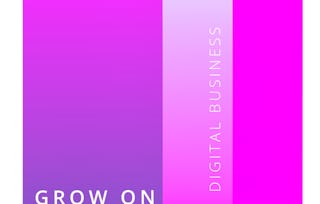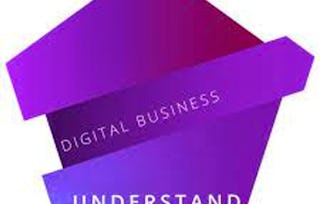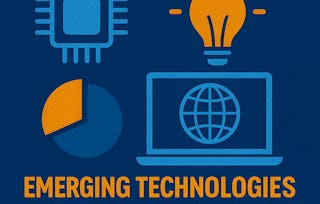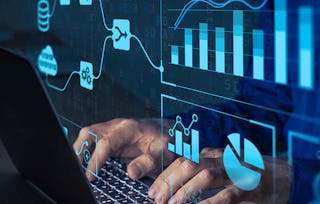"Indian Economy in a Digital World" is designed to provide learners with a comprehensive understanding of the intersection between the Indian economy and the transformative impact of digital technologies. In an era of technological advancements reshaping economic landscapes, this course offers insights into how India navigates this digital revolution and its implications for economic growth, sectors, and policies. Learners will get insights into how disruptive technologies enable new business models, change policy dynamics, and influence socio-economic development in India.

Gain next-level skills with Coursera Plus for $199 (regularly $399). Save now.

Recommended experience
What you'll learn
Gain a comprehensive understanding of India's economic evolution from independence to the digital age.
Explore the transformative impact of digital technologies on key sectors of the Indian economy.
Understand the role of digital public infrastructure in driving innovation, efficiency, and transparency.
Synthesize perspectives from economics, technology, public policy, and business strategy in the digital economy.
Skills you'll gain
Details to know

Add to your LinkedIn profile
See how employees at top companies are mastering in-demand skills

There are 7 modules in this course
"Indian Economy in a Digital World" is designed to provide learners with a comprehensive understanding of the intersection between the Indian economy and the transformative impact of digital technologies. In an era of technological advancements reshaping economic landscapes, this course offers insights into how India navigates this digital revolution and its implications for economic growth, sectors, and policies. Learners will get insights into how disruptive technologies enable new business models, change policy dynamics, and influence socio-economic development in India.
What's included
2 readings
In this module, we will briefly look at the historical aspects of India’s economy and its progression from the time of independence to the current times. We will also explore how the dynamics of several industries have shaped the economy driven by changing policies and world order. We will also delve into the agriculture and services sector, and the challenges faced by the Indian economy.
What's included
7 videos2 readings3 assignments
This module will cover the basic components of the digital economy from a people, process, and technology perspective. The importance of e-commerce and online platforms and their impact on the regulatory structure and labor market will also be explored. The module will explore the evolution of digital payments and the impact it had on the economy.
What's included
8 videos1 reading3 assignments
In this module, we will explore the motivations and genesis of the Digital India program. We will examine the evolution of digital infrastructure, connectivity, and governance aspects in the manufacturing and financial services industry. Digital India has had an impact on the global payments industry. We will understand the current perspectives on the Digital India program.
What's included
9 videos1 reading3 assignments
In the digital age, public infrastructure is no longer confined to physical roads, bridges, and utilities. The virtual space has become pivotal in connecting citizens, delivering services, and driving the modern economy. As this digital transformation ensues, nations grapple with how to construct resilient, efficient, and equitable digital public infrastructure. We will explore the digital public infrastructure's emerging landscape and how it shapes governance and public service delivery. Learn the conceptual foundations and real-world case studies related to developing inclusive, secure, and ethical public digital infrastructure.
What's included
6 videos1 reading2 assignments
Platforms play significant roles in economic growth by facilitating connections, fostering innovation, increasing efficiency, and promoting access to resources. Platforms can contribute to economic growth by lowering barriers to entry, promoting competition, and creating new business models and job opportunities. In this module, we will look at the different platforms and how they impact the demand and supply side of commerce, the role of Artificial Intelligence, and review real-life case studies.
What's included
8 videos2 readings3 assignments
India's digital economy is experiencing a phenomenal rise, and experts predict continued exponential growth in the coming years. A joint report by Google, Temasek, and Bain & Company estimates that the Indian digital economy will reach a staggering $1 trillion by 2030, signifying a six-fold increase from its current valuation. This will have a broad-based impact in internet and e-commerce penetration. Emerging Technologies like Artificial Intelligence, Blockchain and Internet of Things is likely to become more mainstream impacting employment opportunities in the knowledge economy, improving financial inclusion, and fostering innovation and entrepreneurship. Challenges due to cybersecurity, data privacy and skill development will require robust policy initiatives and implementation.
What's included
8 videos2 readings3 assignments
Instructor

Offered by
Explore more from Economics
 Status: Free Trial
Status: Free TrialÉcole Polytechnique
 Status: Free Trial
Status: Free TrialInstitut Mines-Télécom
 Status: Preview
Status: PreviewO.P. Jindal Global University
 Status: Free Trial
Status: Free TrialIIMA - IIM Ahmedabad
Why people choose Coursera for their career




Frequently asked questions
To access the course materials, assignments and to earn a Certificate, you will need to purchase the Certificate experience when you enroll in a course. You can try a Free Trial instead, or apply for Financial Aid. The course may offer 'Full Course, No Certificate' instead. This option lets you see all course materials, submit required assessments, and get a final grade. This also means that you will not be able to purchase a Certificate experience.
When you purchase a Certificate you get access to all course materials, including graded assignments. Upon completing the course, your electronic Certificate will be added to your Accomplishments page - from there, you can print your Certificate or add it to your LinkedIn profile.
Yes. In select learning programs, you can apply for financial aid or a scholarship if you can’t afford the enrollment fee. If fin aid or scholarship is available for your learning program selection, you’ll find a link to apply on the description page.
More questions
Financial aid available,
¹ Some assignments in this course are AI-graded. For these assignments, your data will be used in accordance with Coursera's Privacy Notice.





